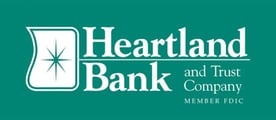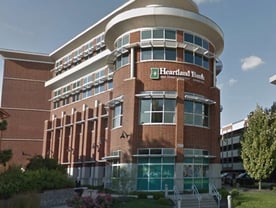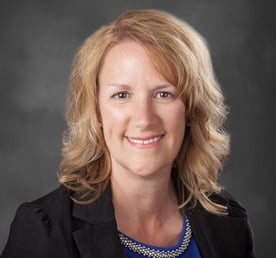

In a Nutshell: Heartland Bank and Trust Company has offices in Central and Northern Illinois and is committed to improving the financial outlook of people in the communities it serves. The bank helps individuals with bad or no credit strengthen their financial stability through educational programs, small-dollar loans, and home loan products with 3% down payments. Heartland Bank aims to build connections with people who may feel they don’t have a place at other financial institutions.
Payday loans may seem like the only option for people with bad or no credit who need money. But if they need to buy something quickly or respond to an emergency, a high-interest payday loan can make things worse.
The high interest rates can leave borrowers with even more debt if they can’t pay the money back quickly. And many payday lenders don’t report loan repayment to credit bureaus, so even paying loans back on time may not improve borrower credit.
While they already charge a substantial percentage on the amount borrowed, payday lenders don’t stop there. If a borrower can’t repay the loan when they receive their paycheck, then the lender extends the loan in a process called “rolling over.” Borrowers typically incur another fee if they need to roll over the loan.

Heartland Bank and Trust Company in Illinois is on a mission to ensure people in its service areas learn how to make informed financial choices and not get trapped in debt cycles when they need loans. That’s why the institution offers products and educational resources designed to help people build their credit profiles.
Most loans, especially payday loans, become problematic when borrowers can’t make a payment.
“It’s a loan they pick up for a couple of weeks that they have to repay for a year or more at high interest rates,” said Belinda Landry, CRA and Fair Banking Officer at Heartland Bank.
Heartland Bank offers alternatives to payday loans for people with poor or no credit that help them build their financial profiles. Those are often small-dollar loans that allow borrowers to meet immediate financial needs while positively affecting their credit scores and bank account balances in the long term.
Educational Resources Promote Credit Responsibility
Heartland Bank has branches from the central part of the state to the Wisconsin border, with nearly $4 billion in assets and has more than 500 employees.
The bank, headquartered in Bloomington, commits many resources to the communities it serves. One way it accomplishes that is through financial education resources. Bank staff members noticed that many people needed help monitoring their finances and credit. That’s why the bank decided to develop a curriculum and have staff members teach classes.

“We do most of the teaching with the exception of a nonprofit who presents in the class, and we have a bank representative there as well,” said Landry.
The content and type of students vary based on their financial needs or that of the community.
“All of our markets are a little bit different based on the demographics. But it’s all very important, and we have developed pretty robust programs,” Landry told us.
Those who want to build their financial knowledge can enroll in any of Heartland Bank’s three types of classes. These include one-on-one educational sessions from bank employees. The bank also provides socially distanced instruction in the community in partnership with local nonprofits. Heartland Bank decided to roll out that option during the pandemic.
“We launched our class in a digital format that anyone who had a smartphone, tablet, or laptop could access. If they couldn’t access it visually, they could call in and hear the content,” Landry said.
The digital instruction resources cover borrowing money, developing a spending plan, and choosing the right banking products.
Small Dollar Loans Can Help Boost Scores
Students who access Heartland Bank’s financial education resources can benefit from a better understanding of borrowing money and building credit. They can also take advantage of the bank’s Credit Repair and Credit Builder loan programs.
The programs arose from Heartland Bank’s interest in giving community members alternatives to payday lenders. Through the program, individuals with bad or no credit can take out small-dollar loans with the bank.

The bank approves the loans for a single borrower with an address, proof of identity, and six months of verified income. The borrower must also have a Certificate of Completion from a Money Matters Financial Education Class and decide on a 12- or 24-month loan term.
The program has been very effective in helping people rebuild their credit.
“We have had great success with this program. We have seen people take advantage of it, do the program in the way it was intended, and now own a house even though they never thought that would be possible,” Landry said.
Some participants in the Credit Repair program also apply for a credit card along with their small-dollar loans. That strategy can help them build two lines of credit simultaneously, and as long as they’re making the payments on both, they may improve their credit score faster.
“A lot of individuals who have depressed credit, we often find that they’re unable to open bank accounts. When they take advantage of the loan program, a savings account goes along with that. They can start establishing a banking relationship that may have been missing because of previous experiences at other banks,” said Landry.
Heartland Bank: A Community Financial Wellness Partner
Heartland Bank strives to provide individuals a path to better credit and a bright financial future. Helping people avoid costly payday loans and other high-interest products is just one aspect of its holistic approach.
One program that is particularly important to Landry helps low-income individuals or those with poor credit purchase their first homes. In her role as a mortgage lender, she encounters many people who can’t get approved for a traditional home loan, which often requires borrowers to have good credit.
That’s why she created a program through Heartland Bank for would-be homeowners with less-than-perfect credit. Borrowers only need to pay a 3% down payment to purchase a home. The program is available to people throughout the bank’s service area.
All of its programs are part of Heartland Bank’s broader effort to partner with communities.
“There is a lot of distrust with banking institutions. We try to overcome that by building relationships with consumers, meeting them where they’re at, hearing their concerns and speaking to their concerns, and showing them why having a banking relationship is safe,” said Landry.
Heartland Bank also prioritizes connecting with individuals who may not have had positive banking experiences in the past.
One of its key initiatives to meet those people has been employee volunteerism. In addition to teaching classes and providing financial advice on the boards of local nonprofits, Heartland Bank team members volunteer hundreds of hours in communities each year. That helps the bank develop a positive presence in each community and makes would-be customers feel more comfortable approaching the institution.
“At the branch level, we help communities meet their needs. Our branch staff members are very invested in their local communities. Our local branches have a finger on the pulse of community needs,” Landry said.
Advertiser Disclosure
BadCredit.org is a free online resource that offers valuable content and comparison services to users. To keep this resource 100% free for users, we receive advertising compensation from the financial products listed on this page. Along with key review factors, this compensation may impact how and where products appear on the page (including, for example, the order in which they appear). BadCredit.org does not include listings for all financial products.
Our Editorial Review Policy
Our site is committed to publishing independent, accurate content guided by strict editorial guidelines. Before articles and reviews are published on our site, they undergo a thorough review process performed by a team of independent editors and subject-matter experts to ensure the content’s accuracy, timeliness, and impartiality. Our editorial team is separate and independent of our site’s advertisers, and the opinions they express on our site are their own. To read more about our team members and their editorial backgrounds, please visit our site’s About page.




